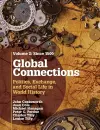
Global Connections: Volume 2, Since 1500
6 authors - Paperback
£39.99
John Coatsworth is Professor of History and Provost of Columbia University and former Dean of Columbia's School of International and Public Affairs. He is author, editor or co-editor of nine books on Latin American economic and international history, including The Cambridge Economic History of Latin America (2006) and Living Standards in Latin American History (2010). He has taught undergraduate and graduate courses in comparative and Latin American history at Columbia since 2006. He previously served at Harvard University and the University of Chicago. Other academic posts have included visiting professorships at El Colegio de México, the National Autonomous University of Mexico, the National University of Buenos Aires, the Instituto Torcuato di Tella in Buenos Aires, and the Instituto Ortega y Gassett in Madrid. He is past president of the American Historical Association, and a member of the American Academy of Arts and Sciences and the Council on Foreign Relations. Juan Cole received his doctorate in Islamic Studies from the University of California, Los Angeles, in 1984. Since then, he has taught history at the University of Michigan. His monographs have treated the Shiite clergy in South Asia, anti-colonial revolution in Egypt, millenarianism in modern Iran, transnational Shiite thought and movements, Napoleon Bonaparte's invasion of Egypt, and the US engagement with the Muslim world. After September 11, he emerged as a public intellectual, with frequent appearances on television and radio and popular columns at Salon and Truthdig. His weblog, Informed Comment, receives a wide readership from those interested in the Western relationship to the Muslim world. Michael Hanagan has taught at Vanderbilt and Columbia Universities and has long experience in teaching undergraduate history. He currently teaches courses in world history, global history and international studies at Vassar College. He is the author of several books, including The Logic of Solidarity and Nascent Proletarians. He has edited a number of collections. Most recently he edited (with Chris Tilly) Contention and Trust in Cities and States. He is also finishing a manuscript with Miriam Cohen on the comparative history of the welfare state in England, France and the United States between 1870 and 1950. He served as senior editor for the journal International Labor and Working-Class History for four years, has been on the Consulting Board of Theory and Society for the last seven. He is currently a co-editor of the series Cambridge Studies in Contentious Politics. He is currently working on an essay on world history for the UNESCO Encyclopedia of Life Support Systems. Peter C. Perdue has over thirty years of experience teaching undergraduates about Asian history, at Harvard University, the Massachusetts Institute of Technology and Yale University. He has also lectured to general audiences in Europe, China, Taiwan, Singapore, Japan and many places in the USA. He has taught surveys of East Asia, modern China, environmental and frontier history, and visual history, along with specialized seminars on Chinese documents, and comparative and global history. His prize-winning book, China Marches West: The Qing Conquest of Central Eurasia, examined the expansion of the Chinese empire into Mongolia, Xinjiang, and Tibet over the two centuries from 1600 to 1800. Exhausting the Earth: State and Peasant in Hunan, 1500–1850 described environmental change over the long term in one province of imperial China. The materials he prepared for the website on the Canton trade (visualizingcultures.mit.edu) won the Franklin Buchanan award for curricular development from the Association of Asian Studies. He has published many articles and conference volumes on comparative empires and frontier history, and has collaborated with engineers, natural scientists, anthropologists and economists in several research projects. He is an elected member of the American Academy of Arts and Sciences and an Honorary Visiting Professor at People's University, Beijing, and Fudan University, Shanghai. Charles Tilly (1929–2008) held faculty appointments at the Universities of Delaware, Harvard, Toronto and Michigan, and the New School University, and finished his career as the Joseph L. Buttenwieser Professor of Social Science at Columbia University. His over 50 books and monographs cover a wide terrain but from his first historical work, The Vendée (1964), to his last uncompleted manuscript, Cities in World History, his work focused on large-scale social change and its relationship to contentious politics, (especially in Europe since 1500). His writings deal with the history of contention but also with urban history and the study of historical migration patterns. His principal works include: The Contentious French (1986), Coercion, Capital, and European States, AD 990–1990 (1990), European Revolutions 1492–1992 (1993), Cities and the Rise of States in Europe, AD 1000–1800 (1994), Contention in Great Britain 1758–1834 (1995), and Contentious Performances (2008). A member of the National Academy of Sciences, the American Academy of Arts and Sciences, the American Philosophical Society, and the Ordre des Palmes Académiques, he received numerous international prizes and honorary degrees. Louise A. Tilly is Emeritus Professor at the New School University where she was Michael E. Gellert Professor of History and Sociology in the Graduate Faculty. She was chair of the Women's Studies department at the University of Michigan and chair of the Committee on Historical Studies of the New School University. In 1993 she served as president of the American Historical Association (AHA). She is the author of Politics and Class in Milan, 1881–1901. With Joan Scott she is the co-author of Women, Work and Family, a classic in the history of women's labor, and, with Charles and Richard Tilly, the co-author of The Rebellious Century, 1830–1930. She is the editor of books on a great variety of topics including the European fertility decline, the European Union and women's employment.